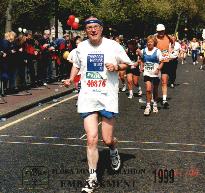London Marathon 1999


On 18 April 1999 I hope to run all 42 km / 26.2 miles of the London Marathon. I am not a fast runner, but I have completed three previous marathons. (See photo). Barring accidents or injury, I expect to be able to complete the course in around five hours.
I'm delighted to report that I not only succeeded in finishing this year's
marathon, but even achieved a personal best time of 4 hours 42 minutes 48
seconds.
That's the time by my own watch, taken from the moment when I crossed the
starting line. I made that 14 minutes 45 seconds after the starter's gun,
so my official time will be about 4:57:33. I have never previously finished
the London with an official time below five hours. For my first marathon,
in 1993, I had to walk for a few miles of the 26.2-mile course. Next time,
1997, I avoided walking (just), but still found it incredibly hard. This
time I felt fine, ran the whole way and finished quite strongly. I think
this is because of doing more long-slow-distance training runs of fifteen
miles and over during the first three months of the year.
The weather on the day was nearly ideal: cool, no wind, no rain. It was
perhaps a little too cool at the start - I was shivering as we waited for
the off in Greenwich Park. But better that than sweltering on a hot day.
As always, the race was a wonderful experience. The London Marathon has
elements of the Olympic Games, with world-class athletes competing to win
the title and break world records. It also has elements of a street
carnival, with runners in fancy dress and bands and sound systems lining
the course, not to mention crowds of applauding spectators. Between those
two headline-catching extremes there are thirty thousand ordinary runners,
like me, who will never break world records but who nevertheless take the
race pretty seriously. It's something we've been training for and worrying
about for several months. We want to achieve a good finishing time, where
'good' is seen in the context of our own potential -- really, we're running
against ourselves. It's also an opportunity to help the charity of our
choice, which adds a further element of seriousness: we owe it to our
sponsors to do our utmost. Now the marathon is over, it's something we'll
remember for the rest of our lives.
Here's what happened:

I am inviting sponsorship contributions in support of the Terrence Higgins Trust.
The THT is a lifeline for thouands of people affected by HIV and AIDS. It has been at the forefront of the fight against AIDS since it was founded in 1982. Today a dedicated team of 1100 trained volunteers and staff offer help, advice, and services. Read more here.
I have been able to forward £800 to the Terrence Higgins Trust, with the promise of a further £200 to come. Thanks, everyone.
Last modified 1999 June 14
So now...